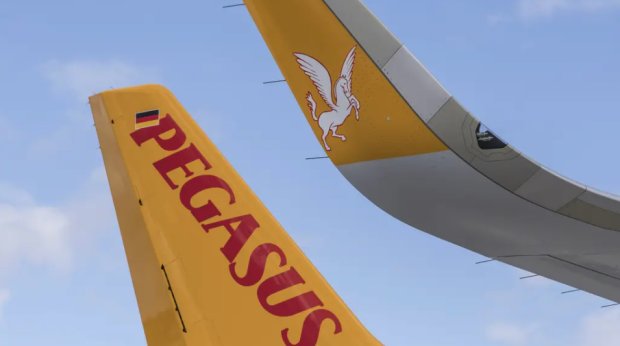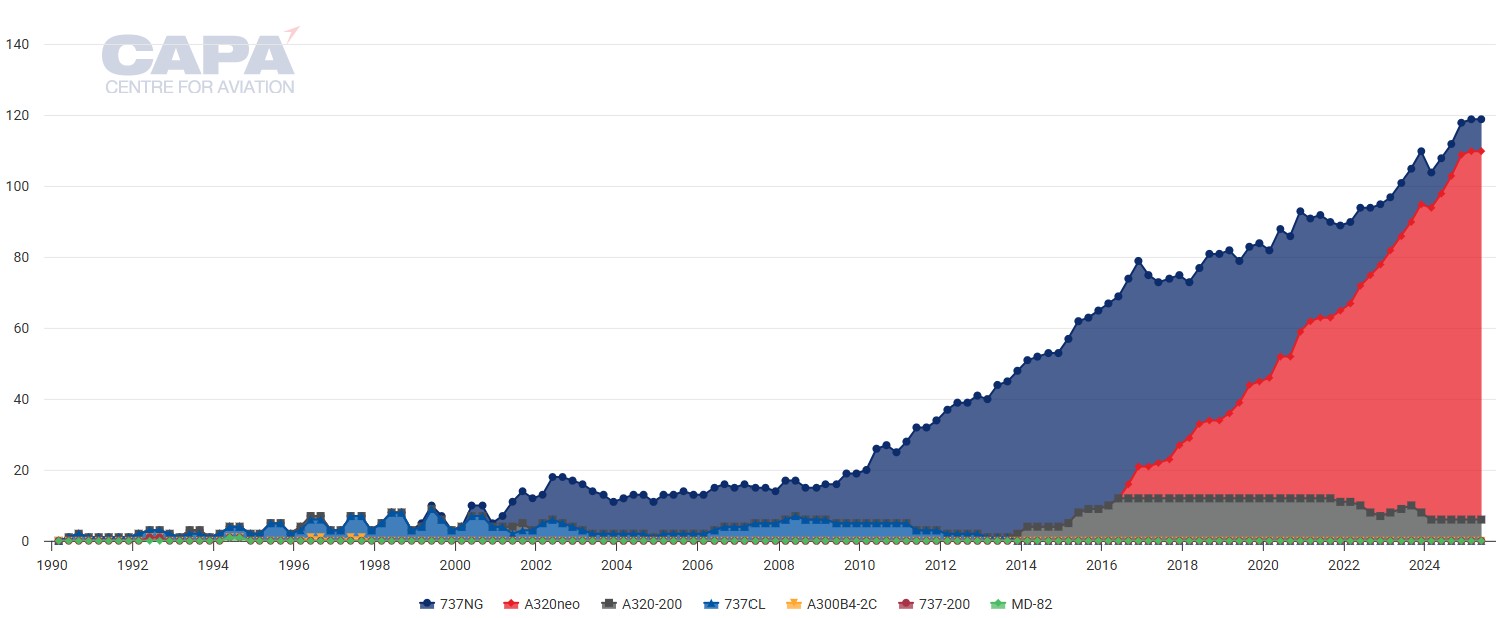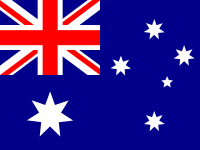Pegasus Airlines – 35 years of pragmatic innovation for Türkiye’s LCC

Pegasus Airlines celebrated its 35th anniversary of launching operations on 15-Apr-2025.
Over the past three and a half decades, the Turkish airline has developed from a charter operator with two Boeing 737-400s to an ultra-low cost carrier with 119 narrowbodies, focusing mainly on the Airbus A320 neo family.
However, its Dec-2024 order for 100 737 MAX10s, with a further 100 options, shows that it was happy to revert to Boeing for the next phase of its growth.
Now one of Europe's most profitable airline companies, Pegasus has succeeded for 35 years through a combination of pragmatism and innovation.
Summary
- Pegasus started charter operations in 1990 with two 737-400s, starting its scheduled flights in 2005.
- Its first 737-800 joined the fleet in 2007; its first Airbus ceo in 2013 and neo in 2016. Today its fleet of 119 aircraft is one of the youngest in Europe.
- It has outstanding orders for 100 737 MAX10s, with a further 100 options.
- Pegasus Airlines' passenger numbers grew at a CAGR of 14% pa from 2008 to 2024. Its network of 154 airports is 58 more than 10 years ago.
- Pegasus achieved its third highest operating margin ever in 2024 (also one of the best in Europe). Ultra-low unit costs are key to its success.
- Its business model is low cost, but pragmatic and innovative.
Pegasus started charter operations in 1990 with two 737-400s…
Pegasus Airlines was founded in Dec-1989 by two Turkish companies: Net Holding A.S., and Silkar Yatırım ve Insaat Organizasyonu A.S., in partnership with the Irish airline Aer Lingus.
Operations started on 15-Apr-1990, with two Boeing 737-400s flying charter services.
The young airline's early development was interrupted by the negative impact of the first Gulf War on tourism in the region in 1991, but demand picked up again in 1992.
In 2005 Pegasus was acquired by Esas Holding, a company owned by Şevket Sabancı and his family.
…launching its scheduled flights in 2005
That same year it also established Istanbul Sabiha Gökçen as its main hub for its fleet of 14 aircraft, and began operating scheduled domestic flights.
Pegasus launched scheduled international flights in 2006 with a service to Stuttgart in Germany.
Nicosia and Vienna were also added in 2006.
Its first 737-800 joined the fleet in 2007; its first Airbus ceo in 2013, and neo in 2016
It took delivery of the first of 40 Boeing 737-800s in 2007 and its 14th in 2010.
By 2011 its network comprised 19 domestic and 30 international destinations and it had 24 737-800s.
In 2012 Pegasus ordered 100 Airbus A320-neo family aircraft (75 firm and 25 options).
Its 40th 737-800 joined the fleet in late 2012, and its first Airbus ceo was delivered in 2013. The first Airbus neo joined the fleet in 2016.
In 2013, 34.5% of the airline's shares were floated on the stock market, with 65.5% retained by Esas Holding.
Pegasus' fleet of 119 aircraft is one of the youngest in Europe
According to the CAPA - Centre for Aviation Fleet Database, Pegasus' fleet comprises 119 aircraft at 14-Apr-2025.
Pegasus Airlines: fleet numbers by aircraft type series, 1990 to 2025

Source: CAPA - Centre for Aviation Fleet Database.
The airline's average fleet age is 4.8 years. This compares favourably with Europe's other ultra-LCCs (10.4 years for Ryanair and 5.0 years for Wizz Air) and an average of 13.8 years for all airlines in Europe.
Pegasus has been replacing its Boeing 737-800s (of which it now has only nine left, average age 10.2 years) with A320neo family aircraft.
The fleet now also comprises six A320ceos, 46 A320neos and 58 A321neos.
It has orders for a further 51 A321neos for delivery until 2029.
It has outstanding orders for 100 737MAX-10s, with a further 100 options
In Dec-2024 Pegasus revitalised its relationship with Boeing, after asking it and Airbus to make competing offers for its largest ever aircraft order.
This resulted in Pegasus placing an order for 100 737MAX-10 aircraft, in a deal that also includes options for a further 100. Deliveries are expected between 2028 and 2033.
With a seat capacity of up to 230, the 737MAX-10 will be Pegasus' largest aircraft, alongside its A321neos.
Pegasus Airlines' passenger numbers grew at a CAGR of 14% pa from 2008 to 2024
In the 16 years from 2008 to 2024, Pegasus' passenger numbers grew from 4.4 million to 37.5 million, making it Europe's ninth largest airline group by passenger numbers in 2024.
See related CAPA - Centre for Aviation report: Europe's top 20 airline groups by passengers 2024: Ryanair on top again.
Its compound 2008-2024 average growth rate was 14.3% pa.
The CAGR slowed from 21.4% pa in 2008-2018 to 4.2% pa in 2019 to 2024, but the latter period was interrupted by the COVID-19 pandemic. The average growth rate from 2020 to 2024 was 26.3%.
Its annual growth rate in 2024 was 17.4% to 37.5 million, while it was 11.9% in 1Q2025.
Pegasus' passenger load factor gained 2.9ppts to 87.7% in 2024 - only 0.2ppts below its highest ever level of 87.9%, achieved in 2019.
However, load factor fell in 1Q2025 by 1.1ppts, compared with the same period a year earlier to 86.1%.
Pegasus Airlines: passenger numbers (million) and load factor (%), 2008 to 2024

Note: charter passenger numbers not separately disclosed for 2014 and 2015 (included with international).
Passenger numbers are passengers flown until 2018, but include paid-for no-shows from '2018 new' onwards.
Source: CAPA - Centre for Aviation, Pegasus Airlines.
Pegasus' network of 154 airports is 58 more than 10 years ago
According to data from CAPA - Centre for Aviation and OAG, Pegasus' network will include 154 airports in its peak summer week, the week commencing 7-Jul-2025; this comprises 38 domestic and 116 international airports.
The equivalent figures 10 years earlier were a total of 96 airports, with 31 in Türkiye and 65 internationally.
Pegasus achieved its third highest operating margin ever in 2024 (also one of the best in Europe)
Pegasus' net profit fell by more than half, from EUR790 million in 2023 to EUR361 million, in 2024.
However, its operating profit increased by 18.2%, from EUR489 million to EUR578 million, with revenue up by 17.1%, to EUR3,126 million.
Pegasus' 2024 operating margin increased modestly (by 0.2ppts) to 18.5%, which was its third highest level ever, after 23.8% in 2022 and 18.9% in 2019.
Pegasus' operating margin is one of the best among European airline groups.
Pegasus' ultra-low unit costs are key to its success
Alongside Wizz Air and Ryanair, Pegasus is one of only three ultra-LCCs in Europe. It has one of the lowest unit costs of any European airline company.
According to CAPA - Centre for Aviation calculations for the 2023 calendar year, Pegasus' cost per available seat kilometre (CASK) was the lowest of any airline in Europe.
CASK typically falls as average trip length increases, but Pegasus achieves its very low unit cost in spite of a shorter average trip length than Wizz Air.
On an average trip length adjusted basis, Pegasus' CASK is approximately 45% lower than other low cost carriers, and 60% lower than full service carriers in Europe.
Perhaps more significantly, Pegasus' full year 2023 CASK was only 47% that of its biggest local rival, Turkish Airlines.
Cost per available seat kilometre (CASK, USc) versus average trip length for Pegasus Airlines, compared with trend lines for other European airlines*

*Trend lines based on 2023 (or nearest financial year).
Source: CAPA - Centre for Aviation CASK Database.
Its business model is low cost, but pragmatic and innovative
Pegasus was established with a low cost base and, as noted above, is Europe's lowest unit cost airline of significance.
However, even before the blurring of lines between the low cost and full service models, it was never a 'purist' LCC. Its business model has always been pragmatic, rather than dogmatic.
For example, it made significant use of travel agents and the GDS when most other LCCs in Europe were withdrawing from these channels
Moreover, it has a track record of innovation in developing ancillaries.
Fairly early on, it introduced elements to its business - such as online seat selection, the sale of travel insurance, and car hire, a flight and shopping card, additional luggage allowance, and mobile phone check-in.
In 2011 it built a flight training centre, and in 2016 it obtained a new cabin simulator.
In 2020 Pegasus became the first airline in the world to join the United Nations Women's Empowerment Principles (WEPs), which offer guidance to business on how to advance gender equality and women's empowerment.
In May-2022 the airline appointed as its CEO Güliz Öztürk - the first woman to hold such a post at a leading airline in Türkiye.
Pegasus' low unit cost is key to its success. In this respect it has an advantage in being based in a country with lower labour costs than much of Europe, but it has built on this with good productivity.
In addition, its pragmatic and innovative approach to the LCC model have underpinned its development over the past 35 years.


